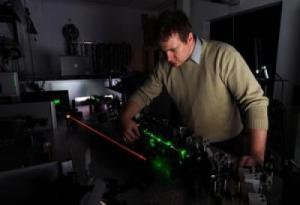Oct 4 2013
A compact new generation optical amplifier has been constructed by physicists from the Laser Centre of the Institute of Physical Chemistry of the Polish Academy of Sciences and the Faculty of Physics of the Warsaw University. The apparatus is extremely efficient and small enough to fit on a desktop and is able to generate over 10 terawatt light pulses.
 New parametric amplifier developed in the Laser Centre at the Institute of Physical Chemistry of the Polish Academy of Sciences in Warsaw and the Faculty of Physics of the Warsaw University allows for constructing desktop-size laser setups capable of generating femtosecond laser pulses with a power of tens of terawatts. Pictured above: Dr Pawe³ Wnuk from the Laser Centre at the new amplifier. (Credit: IPC PAS, Grzegorz Krzy¿ewski)
New parametric amplifier developed in the Laser Centre at the Institute of Physical Chemistry of the Polish Academy of Sciences in Warsaw and the Faculty of Physics of the Warsaw University allows for constructing desktop-size laser setups capable of generating femtosecond laser pulses with a power of tens of terawatts. Pictured above: Dr Pawe³ Wnuk from the Laser Centre at the new amplifier. (Credit: IPC PAS, Grzegorz Krzy¿ewski)
Can a device with a footprint not larger than half of a desktop produce power a few dozen times higher than that generated by all nuclear power stations worldwide? The answer is: "yes – in a pulse"! A new parametric amplifier constructed in the Laser Centre at the Institute of Physical Chemistry of the Polish Academy of Sciences (IPC PAS) and the Faculty of Physics of the Warsaw University (FUW) allows to produce very short (femtosecond) laser pulses with a giant power of 10 terawatt. The new amplifier represents an important step towards construction of compact, portable, relatively low cost high power laser devices that could revolutionize, e.g., anti-cancer therapies.
"Theoretically, the efficiency of parametric amplifiers can reach over 50%. In practice, the best amplifiers of this type are operated at an efficiency of about 30%. We have reached this level already now, and what's more, in a really compact device", says Dr Yuriy Stepanenko (IPC PAS), the chief constructor of the amplifier, adding: "We still improve our setup. In the coming months we are going to increase the amplifier's efficiency by another a few per cent on one hand, while on the other we intend to increase the power of laser pulses up to a few tens of terawatts".
Most lasers generating ultrashort pulses amplify light using sapphire crystals doped with titanium ions. An external laser is used to pump energy into the crystal, and a fraction of the energy is subsequently taken over by a laser beam being amplified. The method has numerous disadvantages. One of the major ones is that the crystals warm up strongly leading to adverse distortions of the cross section of the laser beam. As a result, the crystals must cool down virtually after each laser shot.
Luckily, non-linear optical effects can be used to construct amplifiers of a different type. These parametric amplifiers transfer effectively energy directly from the pumping laser beam to the beam being amplified. As the input energy is not stored anywhere, there are no adverse thermal effects, and the amplified pulses have excellent parameters. Parametric amplifiers can amplify light by hundreds of millions of times on an optical path of a few centimeters only. That's also why they are really small in size, especially as compared with the standards of high power optics. The instrument from the Laser Centre of the IPC PAS and the FUW comfortably fits half of a typical desktop.
The new amplifier will be used for construction of an x-ray source and to generate experimentally protons and secondary neutrons.
One of the long-term objectives of the research on parametric amplifiers is to generate laser pulses with power of 200 TW and higher. Such powerful light pulses could be used for accelerating protons to energies that are useful in medical therapies, for instance to selectively kill cancer cells. The existing techniques for proton acceleration require construction of huge and high cost accelerators. High power lasers would allow for significant increase in availability of the state-of-the-art proton therapies, with simultaneous radical reduction of treatment costs for cancer patients.